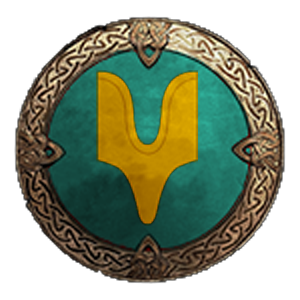Hello everyone, its time for another preview, this time of Rusĭska Zemlya or in english- The Kievan Rus.

The Principality of the Kievan Rus' rule over a vast area of land, stretching from the Baltic sea in the North to the Black sea in the south. They are a mix of many tribes, both Norse and Slavic, living under the rule of their princes. Many of the nobles are Varangians from Sweden who have either come with their families many years ago, or recently came searching to earn a fortune in the East.
Detailed history:
Sometime around the year 862, a Norse chieftain named Rurik (Old Norse Rørik or Hrœrekr) arrived in the lands now known as Russia. The numerous yet unorganized Slavic tribes had been warring for centuries, and there would no end unless they were conquered by a foreign ruler. According to the Rus' Primary Chronicle, the tribes knew this and sent a message to the Varangians (another name for the Swedes) to come rule over them. And so, the foundation of the Rus' was born. Although the first years under Rurik were chaotic, his dynasty would come to rule one of the most powerful states in Europe.
Rurik passed his rule to his kinsman, Oleg, upon his death in the year 872. Though he had a son, named Igor (Old Norse Ingvar), he was much too young to rule over the Rus', and so Oleg ruled as his regent. During Oleg's reign, he pushed the Rus' even closer to their Golden Age. He wrestled control of Kiev from the two rogue Varangian warlords Haskuldr and Dyri, and moved the capital there from Novgorod (then known as Holmgarðr). In the year 907, a few years before his death, he mounted a massive raid against great Constantinople, capital of the Eastern Roman Empire and the richest known city in the world. Two thousand ships quickly descended on the lands of the Greeks. Upon finding the gates of the city closed, and a massive chain barring the Bosporus, Oleg had his men craft wheels for his ships, and rolled them to the walls of the city. He fixed his shield above the gates, showing the Greeks that he and his men were indeed a threat. He won a favourable peace treaty, allowing for a great increase in trade between the Rus' and Romans. Igor followed his kinsman's footsteps, furthering the relationship with the Romans. Although much of his reign is rather uneventful, we do know that he deepened the dynamics between the Rus' and the Eastern Roman Empire. In 941, Igor launched a massive raid of 1,000 ships upon an undefended Constantinople. The Greeks outfitted 15 retired ships with Greek fire. The Rus' set upon them, unknowing of the terrible weapon onboard each ship. As soon as the Rus' saw the flames, they turned back and raided into Thrace instead. The Roman navy finally caught up to them, and sent them back to their lands. In 944, Igor once again led a raid, but this time the Romans were prepared. Peace talks immediately began, and in 945 another treaty was sign, increasing trade between the two factions. Not long after, Igor was killed during a revolt from one of the Slavic tribes he collected tribute from.
His wife, Olga, ruled as regent until the year 963, when his son Svyatoslav (Sveinaldr in Old Norse) finally came of age. He was soon to become one of the greatest rulers in Kievan Rus' history. Very soon after he became King (or Grand Prince, depending on the culture of the narrator), he was approached by the Romans to attack his neighbors, the Khazar Empire. He began rallying the many Slavic tribes under Khazar rule to his cause, and those who did not join willingly were conquered. Svyatoslav expanded his territory until finally he was close enough to attack al-Khazaria. In 965, he attacked and destroyed the cities of Sarkel and Kerch, and built the Rus' fortress Belaya Vyezha. Soon after, he proceeded to the Khazar capital Atil, and destroyed it. After crushing al-Khazaria, he returned home to Kiev - destroying the kingdom of Alania on the way.
Very soon after his return, the Romans again asked him to attack an enemy of the Empire - the Danube Bulgarians. Svyatoslav received 15,000 pounds of gold, and set off with 60,000 men. The Rus' and Bulgarians met in spring of 968 at the battle of Silistra. The Rus' won a crushing victory over the Bulgarians, and this lead the way to the conquering of 80 fortresses, mainly the cities of Preyaslavets and Preslav. Now, the Romans ask for Svyatoslav to give to them all of his conquests in Bulgaria - will he do so, and maintain peace with the Roman Empire? Or will he refuse, and be forced to stand strong against the strongest empire in the known world?
Dont forget to check out pictures :)



This comment is currently awaiting admin approval, join now to view.